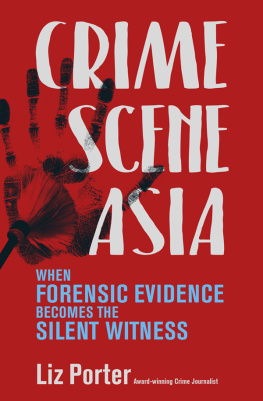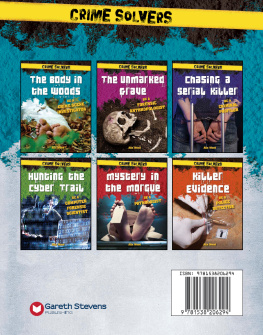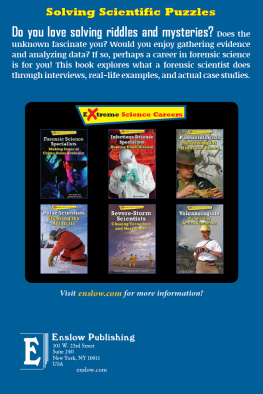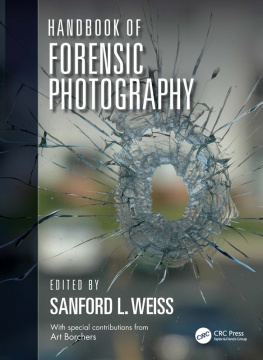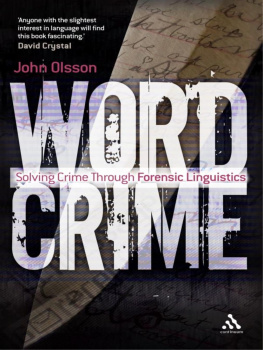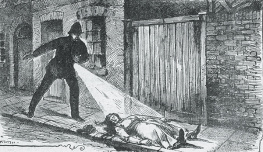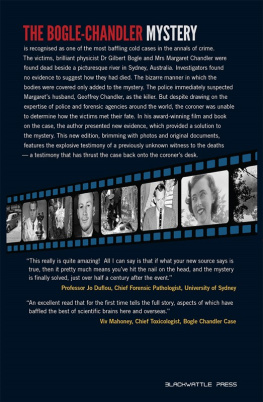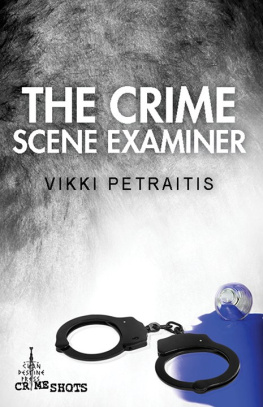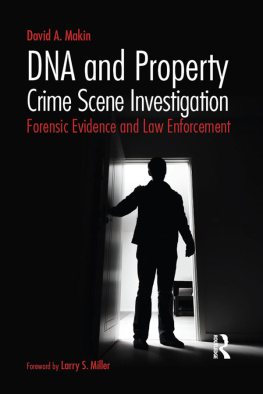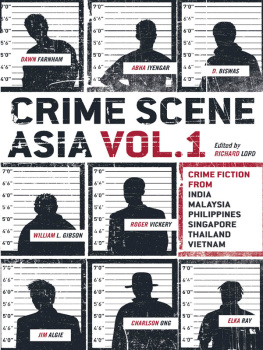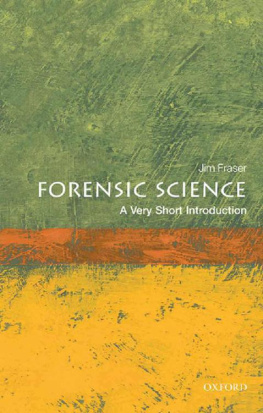PRAISE FOR CRIME SCENE ASIA
A fascinating book. This is an easy to read compendium of some of the most interesting and important criminal cases in Asia and Australia over the last decades, revealing the difficulties, successes and trials and tribulations associated with complex forensic science and medical evidence in the court room.
Forensic pathologist Johan Duflou
Clinical Professor at the Sydney Medical School of the University of Sydney, Australia
An irresistible read. Gripping tales of the relentless pursuit of truth through forensic science, no matter the odds.
Dr Raquel del Rosario-Fortun
Professor at the University of the Philippines-College of Medicine, the Philippines
Liz Porter takes great pains in understanding complex scientific evidence and presents it with such clarity. It is a well-researched and presented book of criminal cases, which is fascinating to read.
Dato V Sithambaram
Eminent criminal lawyer, Malaysia
An absolutely fascinating read: Liz Porter has a journalists eye for detail and a storytellers ear for narrative. Put them together and we have a superbly told series of tragic (and sometimes tragicomic) true stories leaving the reader stunned by the way ordinary lives can drift into extraordinary drama.
Nury Vittachi,
Author and Chairman, Asia-Pacific Writers and Translators Association, Hong Kong
PRAISE FOR LIZ PORTERS EARLIER BOOKS
Written On The Skin: an Australian forensic casebook
Each of her stories reads like good crime fiction a compulsive read.
The Sydney Morning Herald
Highly addictive reading for any fan of forensics or CSI.
Kathryn Fox, bestselling author of Without Consent
A delightful and entertaining writer.
Weekend Australian
Cold Case Files: past crimes solved by new forensic science
Edgar Allan Poe would have applauded the recent Sisters-in-Crime Davitt Award for True Crime being awarded to Melbourne writer Liz Porter for her brilliant Cold Case Files. He introduced the notion of ratiocination the exercise of reason in the process of analysing clues. And Porter investigates many as she sets the advances of forensic science technology, so recognisable from TV crime shows, into an investigative context.
Weekend Australian
Liz Porter writes grippingly, though soberly, and with a scrupulous attention to scientific detail.
The Age
They read like scripts for a CSI show or an episode of Dexter but what makes the mysteries in Cold Case Files by Liz Porter so chilling are that they come from real life police files. The TV shows are sexed up to entertain or titillate viewers; Cold Case Files is not, and its all the more gripping because of it.
Townsville Bulletin (Australia)
Advances in forensic science have afforded modern criminal investigators some remarkable opportunities. Long-time journalist Liz Porter takes a detailed look at how forensics have solved a series of Australian murders which originally either baffled police or led them to imprison the wrong person. True crime fans, this is for you.
Queensland U On Sunday (Brisbane, Australia)


2018 Liz Porter and Marshall Cavendish International (Asia) Private Limited
Published by Marshall Cavendish Editions
An imprint of Marshall Cavendish International

All rights reserved
No part of this publication may be reproduced, stored in a retrieval system or transmitted, in any form or by any means, electronic, mechanical, photocopying, recording or otherwise, without the prior permission of the copyright owner. Requests for permission should be addressed to the Publisher, Marshall Cavendish International (Asia) Private Limited, 1 New Industrial Road, Singapore 536196. Tel: (65) 6213 9300. E-mail:
Website: www.marshallcavendish.com/genref
The publisher makes no representation or warranties with respect to the contents of this book, and specifically disclaims any implied warranties or merchantability or fitness for any particular purpose, and shall in no event be liable for any loss of profit or any other commercial damage, including but not limited to special, incidental, consequential, or other damages.
Other Marshall Cavendish Offices:
Marshall Cavendish Corporation. 99 White Plains Road, Tarrytown NY 10591-9001, USA Marshall Cavendish International (Thailand) Co Ltd. 253 Asoke, 12th Flr, Sukhumvit 21 Road, Klongtoey Nua, Wattana, Bangkok 10110, Thailand Marshall Cavendish (Malaysia) Sdn Bhd, Times Subang, Lot 46, Subang Hi-Tech Industrial Park, Batu Tiga, 40000 Shah Alam, Selangor Darul Ehsan, Malaysia
Marshall Cavendish is a registered trademark of Times Publishing Limited
National Library Board, Singapore Cataloguing-in-Publication Data
Names: Porter, Liz
Title: Crime scene Asia : when forensic evidence becomes the silent witness / Liz Porter.
Description: Singapore : Marshall Cavendish Editions, [2018]
Identifiers: OCN 1003154361 | e-ISBN 978 981 4794 54 1
Subjects: LCSH: Forensic sciencesAsia. | MurderInvestigationAsia. | Criminal investigationAsia.
Classification: DDC 363.25095957dc23
Printed in Singapore by Markono Print Media Pte Ltd
For my darling daughter Alice.
In memory of my late mother, biochemist Rose Porter (19162005). How I wish she were still here to talk to about life, books and science.
And for my good friend Herbert, who read so many versions of the openings of the stories in this book and always remained enthusiastic and encouraging.
CONTENTS
FOREWORD
It was a book that led me to the world of forensic medicine: Dead Men Tell Tales, a 1968 Pan paperback by Jurgen Thorwald. A book in the true crime genre, it left me starry-eyed about the power of forensic science and medicine to catch murderers: a riveting read for a sheltered schoolboy. When I have been back to it, I can recall my excitement; but, predictably, it reads now like a pale impression of reality.
Fast forward almost 50 years to the gripping cases in this collection and to Liz Porters extensive research and wonderfully engaging style. The way she handles their many aspects, some of which are nicely nuanced, demonstrates respect for how sophisticated consumers of contemporary forensic fare have become. Her cases each have their own special mix of suspects, crime scenes, police, lawyers, judges, scientists, doctors, psychologists and psychiatrists; these interact in their own way to finally result in a verdict. The vagaries, the uncertainties along the way are on brilliant display here too but ultimately all is distilled to one of two formal outcomes: guilty, or not; and, on a number of occasions, both.
Examination of the scene is a crucial component of the evaluation of virtually all serious crime. It is only by re-creating what happens at the scene that the court can come to conclusions about the actions of the accused. Such conclusions might be arrived at via corroboration of the evidence of other witnesses (as well as the accused), inferences drawn simply from the evidence and nothing else, and in murder cases, these include inferences about the state of mind and intentions of the accused. The terrible Singapore case of the missing eight-year-old girl captures all of this, and additionally captures the tension of the high stakes associated with a capital case. The accused, after being convicted despite having a low IQ and possibly mental illness (and therefore arguably not responsible for his actions) was sentenced to death. The sentence was upheld 2:1 on appeal, and carried out.

